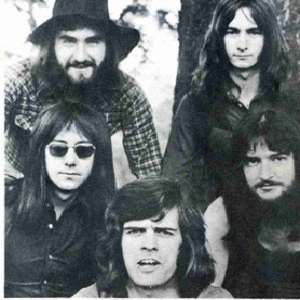
The band formed in Glasgow in 1969, taking its name from a satirical work written by John Gray in 1728. The original line-up consisted of Martin Griffith (Vocals), Rick Gardiner (Guitars and Vocals), Alan Park (Keyboards), Gordon Sellar (Bass, Acoustic Guitar and Vocals) and Raymond Wilson (Drums and Percussion). Despite having published many albums, their fame has never left the Progressive circuit. With this formation in 1970 they recorded their debut album “Act One“, characterized by an organ-driven Prog Rock, with a guitar in the 60s style. The main feature of the group is the influence of classical music, often their songs include modern reinterpretations of classical music pieces. “Raymond’s Road” is not an example, with a tribute to the great classics, the Peer Gynt by Grieg, Toccata And Fuga In D by Bach and A La Turka by Mozart, played on the hammond. The same year another keyboard is added to the band, with Virginia Scott in the formation. Thus they published their second work “Waters Of Change” in 1971, built around the double keyboard, with hammond solos and the mellotron symphonies, as well as the good performance of the guitars. The voice is incisive and warm at the same time, the bass lines and the drums create powerful and well-developed rhythms. The band appeared in the same year at the legendary Beat Club for the German TV and at the First British Rock Meeting, achieving good success. With “Pathfinder” from 1972, produced on Vertigo Records, like the previous ones, we reach one of the highest moments of their recording career. The band adds the piano and the harpsichord, the power of the guitar is remarkable and the influences of Scottish Folk given by the bagpipes, make this record unique. The inventiveness and the technique expressed by all the members make this group one of the most sought after and appreciated in Prog. In 1973, they published “Get You Dog Off Me“, the last with Vertigo, before moving to Germany. Their sound is changing and the songs become shorter and less appealing, even though they are still of a good standard. After moving to Germany, they began collaborating with Jupiter, producing “Sagittary” in 1974. As in the previous one the pieces are of short duration, and the compositional verve of the first works seems to have faded. The rhapsodies listened to in the first albums leave room for some good tracks, developed in a simpler form and close to the “song.” After an absence from the recording studios for five years, in 1980 the band recorded “Lifeline“, returning to Vertigo Records, with little elaborate sounds and closer to the sound of the 80s. Until the new millennium, the band is no longer talking about itself, when in 2007 it returns as a trio: Rick and Tom Gardiner and Virginia Scott, producing “Close To My Heart” on Repertoire Records. The sound is more modern, closer to Prog, but still very distant from that of the first three works. In 2009, again for the same label, “Touching The Edge” was recorded, which follows the sound tracks of the previous one with the addition of wind instruments in some sections. The following year he released another album with the addition of Lee Gardiner, with long tracks, but moving to a more electronic and at times cosmic sound. Also the following “Suddenly Ahead Ahead“, also from 2010, proposes a weave of more electronic keyboards and sounds close to German-inspired cosmic music. They return a trio and in 2011, they publish “Promise In Motion“, without adding or modifying anything heard in the previous ones. In 2012, “Mrs. Callegaris Lighter” is the latest work produced by the band, even more experimental and electronic, after which it doesn’t affect anything anymore. A band that with the first three, albums participated in making the Prog great, but especially with the releases of the new millennium, it was quite different from those productions. The style of the 70s was similar to groups like ELP and Nice, to then lighten first and then radically change, especially after the German adventure. Notable passages of classical music, the long Prog tracks, make the first albums of milestones of the genre. All the music has undergone changes, even Beggar’s Opera, inserting electronic and experimental sounds at the expense of a Progressive sound previously expressed at the highest levels.
Disocgraphy
(1970 Act One [Vertigo]
(1971) Waters of Change [Vertigo]
(1972) Pathfinder [Vertigo]
(1973) Get Your Dog Off Me! [Vertigo]
(1974) Sagittary [Jupiter Records]
(1975) Beggars Can’t Be Choosers [Jupiter Records]
(1980) Lifeline [Vertigo]
(2007) Close to My Heart [Repertoire]
(2009) Touching the Edge [Repertoire]
(2010) All Tomorrows Thinking [RGS Music]
(2011) Lose a Life (EP) [Repertoire Records]
(2011) Promise in Motion [RGS Music]
(2012) Mrs. Calagari’s Lighter [RGS Music]
Past Members
Alan Park / Keyboards
Martin Griffiths / Vocals
Colin Pattenden / Bass
John Hollywood / Drums
Raymond Wilson / Drums, Percussions
Ajijo / Saxophone
Linnie Paterson / Vocals
Gordon Sellar / Vocals, Guitar, Bass
Colin Fairley / Drums, Percussions
Peter Scott / Vocals
Clem Cattini / Drums
Actual Lineup
Tom Gardiner / Drums
Virginia Scott / Vocals, Keyboard, Cello
Rick Gardiner / Vocals, Guitar
Beggar’s Opera |Official Website|Facebook Page|Twitter|YouTube Channel|
